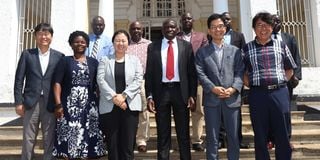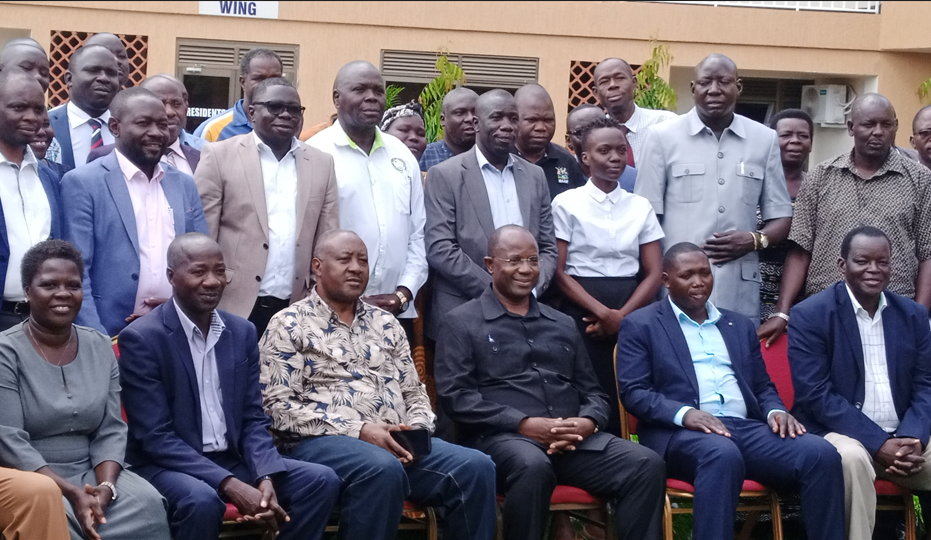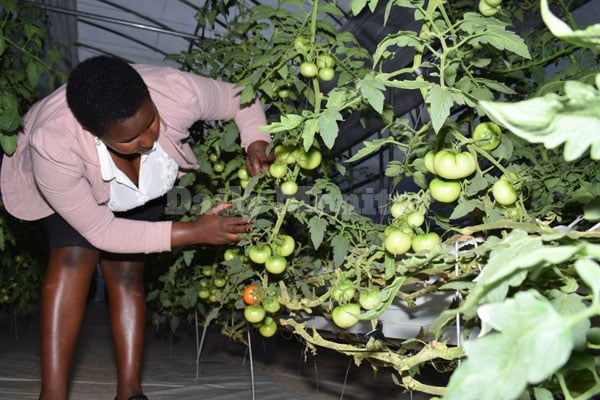Naro starts vegetable seed production

Naro Deputy DirectorGeneral in charge of Agricultural Technology Promotion, Dr Sadik Kassim (third right), and KOICA Country Director Jihee Ahn (third left).PHOTO/Shabibah Nakirigya
What you need to know:
With the increasing market demand for vegetables and fruits driven by rapid urbanisation and changing dietary needs, the adoption of these improved technologies is expected to double Uganda’s current annual vegetable production.
The National Agricultural Research Organisation (Naro) together with Korea International Cooperation Agency (KOICA) have embarked on the process of producing vegetable seeds in Uganda.
The vegetable seed project aims to lay the foundation for the mid-to-long-term development of new vegetable varieties in Uganda and strengthening the certification system and disseminating certified seeds for five vegetable crops: nakati, tomato, onion, cabbage, and chili pepper.
Horticultural seeds
Speaking to the media this week while handing over the green house to Naro, the newly appointed KOICA project manager, Young-Rog Yeoung said this initiative considerably contributes to the agricultural industrialisation agenda by fostering local production of horticultural seeds.
“This initiative will be substituting imports from Europe and Asia which are currently estimated to be Shs25.8 billion,” he says.
Increased demand
Young-Rog Yeoung further said with the increasing market demand for vegetables and fruits driven by rapid urbanisation and changing dietary needs, the adoption of these improved technologies is expected to double Uganda’s current annual vegetable production, which is estimated at 5.3 million tonnes a year.
The KOICA country director Jihee Ahn said the initiative has started with the greenhouses as a fundamental set of infrastructures, serving as a stepping stone to the next level, which includes procurement and installation of equipment for the seed value chain.
“For all the time I have been in Uganda, I have observed the country’s excellent weather conditions for vegetable production, not only for local consumption but also for export to the international market and I think it’s going to contribute much to our production,” he said.
Ahn said he is impressed by the breeding programme exhibited in all the Naro institutes he has visited. “We should leverage the very good weather to export vegetables to foreign markets and improve farmers’ incomes,” he noted. Naro deputy director general in charge of agricultural technology promotion, Dr Sadik Kassim, commended the Korean government for its longstanding partnership with Uganda through Naro, which has seen several projects implemented in the horticulture sector.
“We started with the citrus value chain development project in eastern Uganda, which has supported many farmers in Teso and neighbouring areas that grow fruits for commercial purposes and this has helped them to improve their income status,” he said.
He noted that Korea was once again pioneering the vegetable production enhancement drive in Uganda and appreciated the infrastructure that has already been set up.
“Ugandan farmers have been highly dependent on imported seeds for tomatoes, onions, and cabbages, but the vegetable seed project will bring this to an end. The planned training of Naro scientists in Korea would result in skills transfer to sustain vegetable seed production in the country,” he said.
Dr Kassim underscored the importance of maintaining the project facilities in operation and pledged that their operationalisation would be incorporated into the Naro annual work plans and budgets.
Production
The production of seeds will be conducted in three Naro institutes which include National Crop Resources Research Institute (NaCRRI) in Namulonge, the Mukono Zonal Agricultural Research and Development Institute (MuZARDI) in Ntawo, Mukono District, and the National Agricultural Research Laboratories (NaRL) at Kawanda, Wakiso District, where the facility for seed testing and certification has been constructed.
The Buganda Kingdom, under the auspices of MuZARDI and Luwero District Local Government, is also hosting part of the project infrastructure.
The project has several components which include the establishment of infrastructure for vegetable breeding and certification, empowerment of human resource capacity, establishment of infrastructure for certified vegetable seed production, building farmers’ capacity, and improving distribution, dissemination, and farmers’ awareness of certified seeds.
Key fact
Naro deputy director general incharge of agricultural technology promotion, Dr Sadik Kassim, has commended the Korean government for its longstanding partnership with Uganda through Naro, which has seen several projects implemented in the horticulture sector.




